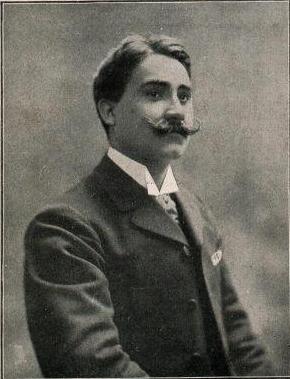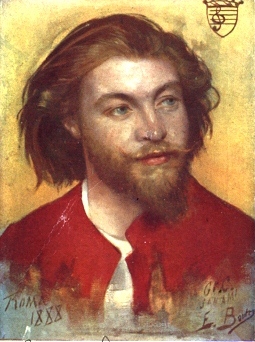Julien (opera) on:
[Wikipedia]
[Google]
[Amazon]
''Julien, ou La vie du poète'' (''Julien, or The Poet's Life'') is a ''poème lyrique'', or


 :Time: 19th century
:Place: Initially in Rome; then several others
Prologue
''Enthousiasme ("Filled with enthusiasm")''
Julien, as a
:Time: 19th century
:Place: Initially in Rome; then several others
Prologue
''Enthousiasme ("Filled with enthusiasm")''
Julien, as a
Complete piano/vocal score
published in 1913 by M. Eschig (on
opera
Opera is a form of theatre in which music is a fundamental component and dramatic roles are taken by singers. Such a "work" (the literal translation of the Italian word "opera") is typically a collaboration between a composer and a libr ...
, by composer Gustave Charpentier
Gustave Charpentier (; 25 June 1860 – 18 February 1956) was a French composer, best known for his opera '' Louise''.Langham Smith R., "Gustave Charpentier", ''The New Grove Dictionary of Opera.'' Macmillan, London and New York, 1997.
Life and c ...
. The work is devised in a prologue and four acts and uses a French libretto by the composer. ''Julien'' is a sequel to Charpentier's ''Louise
Louise or Luise may refer to:
* Louise (given name)
Arts Songs
* "Louise" (Bonnie Tyler song), 2005
* "Louise" (The Human League song), 1984
* "Louise" (Jett Rebel song), 2013
* "Louise" (Maurice Chevalier song), 1929
*"Louise", by Clan of ...
'' (1900) and describes the artistic aspirations of Louise's suitor Julien. The opera premiered in Paris at the Salle Favart
The Salle Favart, officially the Théâtre de l'Opéra-Comique, is a Paris opera house and theatre, the current home of the Opéra-Comique. It was built from 1893 to 1898 in a neo-Baroque style to the designs of the French architect Louis Bernie ...
on 4 June 1913.
Background and performance history
Like that of ''Louise'', the plot of ''Julien'' is semi-autobiographical and requires many characters and chorus roles; in ''Julien'', the female lead portrays four smaller characters in addition to the role of Louise. The opera integrates elements of an earlier composition, ''La vie du poète'', a symphony-drama of 1888–1889. The chorus consists largely of ''filles du rêve'' ("girls of the dream"), fairies, and chimeras as well as various men's roles, mainly different kinds of working class men. Charpentier stated that, except in the prologue, "Louise and the various characters who surround Julien are not so much real people as an exteriorized realization of their inner souls". The opera was not well received at its premiere, although it did gain Gabriel Fauré's admiration for itsexpressionist
Expressionism is a modernist movement, initially in poetry and painting, originating in Northern Europe around the beginning of the 20th century. Its typical trait is to present the world solely from a subjective perspective, distorting it rad ...
qualities.Richard Langham Smith: "''Julien''", '' Grove Music Online'' ed. L. Macy (Accessed February 19, 2009) Apart from two productions in 1914, one of which was at the Metropolitan Opera
The Metropolitan Opera (commonly known as the Met) is an American opera company based in New York City, resident at the Metropolitan Opera House at Lincoln Center, currently situated on the Upper West Side of Manhattan. The company is oper ...
in New York City with Geraldine Farrar
Alice Geraldine Farrar (February 28, 1882 – March 11, 1967) was an American lyric soprano who could also sing dramatic roles. She was noted for her beauty, acting ability, and "the intimate timbre of her voice." She had a large following a ...
and Enrico Caruso in the main roles, it had not been revived until 3 December 2000, when it had its German premiere. That production, at the Theater Dortmund
Theater Dortmund is a theatrical organization that produces operas, Musical theatre, musicals, ballets, plays, and concerts in Dortmund, Germany. It was founded as the Stadttheater Dortmund in 1904. Supported by the German Government, the organiza ...
, was directed by John Dew and conducted by Axel Kober
Axel Kober (born 10 February 1970) is a German conductor. Since 2009 he has been the music director of the Deutsche Oper am Rhein.
Kober was born in Kronach and studied conducting under Peter Falk and Günther Wich at the Hochschule für Musik W ...
.
There are no full-length recordings of the opera. However, Julien's aria "La voix de la nuit", sung by Maurice Dutreix, appears as the final track on the 1935 abridged recording of ''Louise'' (re-released in 2003 on Naxos Records).''Louise'', recording (abridged)
Roles

Synopsis
 :Time: 19th century
:Place: Initially in Rome; then several others
Prologue
''Enthousiasme ("Filled with enthusiasm")''
Julien, as a
:Time: 19th century
:Place: Initially in Rome; then several others
Prologue
''Enthousiasme ("Filled with enthusiasm")''
Julien, as a Prix de Rome
The Prix de Rome () or Grand Prix de Rome was a French scholarship for arts students, initially for painters and sculptors, that was established in 1663 during the reign of Louis XIV of France. Winners were awarded a bursary that allowed them t ...
winner, is studying in Rome at the Villa Medici
The Villa Medici () is a Mannerist villa and an architectural complex with a garden contiguous with the larger Borghese gardens, on the Pincian Hill next to Trinità dei Monti in Rome, Italy. The Villa Medici, founded by Ferdinando I de' Medici, ...
. This resembles the life of Charpentier as he too was a Prix de Rome winner. However, after this point, the opera moves from the real world into the imagination until the final tableau
Tableau (French for 'little table' literally, also used to mean 'picture'; tableaux or, rarely, tableaus) may refer to:
Arts
* ''Tableau'', a series of four paintings by Piet Mondrian titled '' Tableau I'' through to ''Tableau IV''
* ''Tableau vi ...
, set in Montmartre
Montmartre ( , ) is a large hill in Paris's northern 18th arrondissement. It is high and gives its name to the surrounding district, part of the Right Bank. The historic district established by the City of Paris in 1995 is bordered by Rue Ca ...
, returns the plot to reality.
Act 1
''Au pays du rêve ("In dreamland")''
It contains three settings: the Holy Mountain, followed by a setting in the Accursed Valley, and lastly the Temple of Beauty.
Act 2
This takes place in the Slovakian countryside and follows Julien as he experiences doubts in creating his artwork.
Act 3
''Impuissance'' ("Impotence")''
This is located in Brittany's wild countryside.
Act 4
''Ivresse ("Intoxication")''
Set in Montmartre, it closes in the Place Blanche Place Blanche in Paris, France is one of the small plazas along the Boulevard de Clichy, which runs between the 9th arrondissement of Paris, 9th and 18th arrondissement of Paris, 18th arrondissements (Parisian districts) and leads into Montmartre. I ...
with the sudden appearance of the Temple of Beauty.
References
External links
*Complete piano/vocal score
published in 1913 by M. Eschig (on
Archive.org
The Internet Archive is an American digital library with the stated mission of "universal access to all knowledge". It provides free public access to collections of digitized materials, including websites, software applications/games, music, ...
)
*
{{Authority control
French-language operas
Operas by Gustave Charpentier
1913 operas
Operas
Operas set in France
Opera world premieres at the Opéra-Comique
Sequels